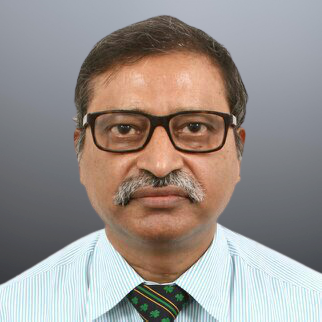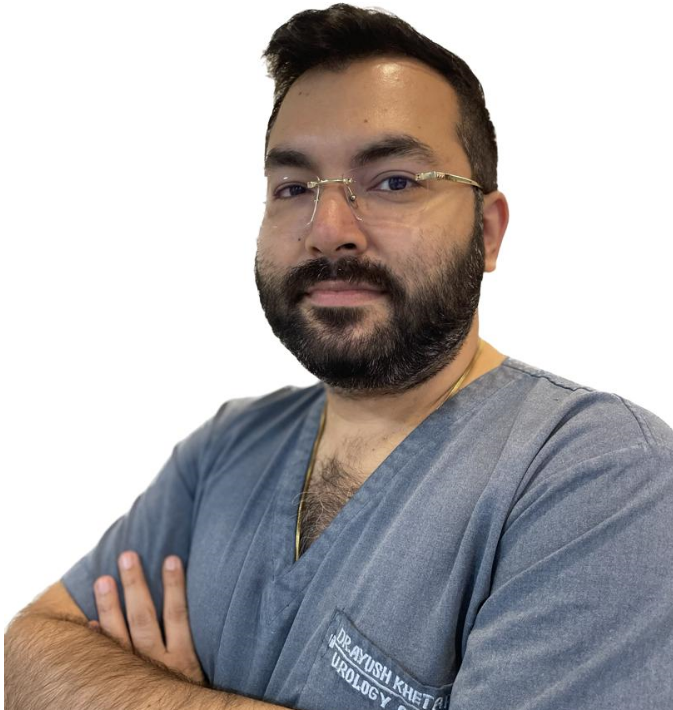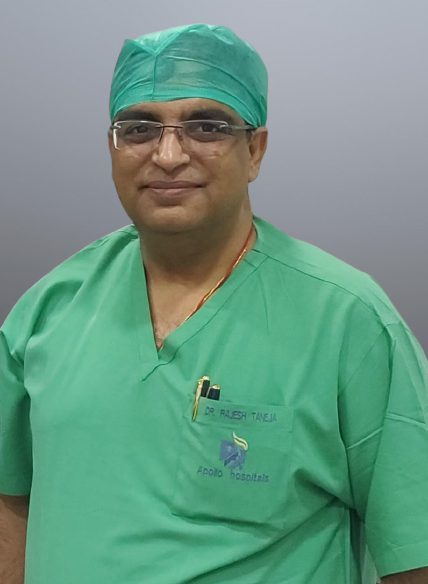Search Result: 13

Dr Ajit Saxena
MBBS, MS, DU
Registration No
366
Language
English, हिंदी

30 years experience overall

Sarita Vihar , Delhi
MON | THU, SAT(02:00 PM-03:00 PM | 12:00 PM-01:00 PM)

Dr Anshuman Agarwal
MBBS, MS, MCh
Registration No
479639
Language
English, हिंदी, தமிழ்

21 years experience overall

Sarita Vihar & Nehru Enclave , Delhi
MON- SAT(11:00 AM-04:00 PM)

Dr Ashish Sabharwal
MBBS from R.G. Kar Medical College, Calcutta. (1994-1999) M.S. (General Surgery) from BLDEA Medical College, Karnataka University (2001-2004) and DNB (Urology) from Apollo Hospital, New Delhi (2005-2008) Advanced Fellowship in Endourology and Robotic Surgery, Jackson Health System, Miami, Florida, USA (June 2008 to May 2011) HIFU for Prostate Cancer Doctors Hospital, Nassau, Bahamas [April 23& 24, 2010]
Registration No
1120945
Language
English, हिंदी

20 years experience overall

Sarita Vihar , Delhi
MON | TUE | WED | THU | FRI | SAT(04:00 PM-06:00 PM | 12:00 PM-04:00 PM | 10:00 AM-12:00 PM | 12:00 PM-04:00 PM | 04:00 PM-06:00 PM | 10:00 AM-12:00 PM)

Dr Ayush Khetarpal
MBBS, MS (General Surgery), MCh (Urology)
Registration No
4642687
Language
English, ગુજરાતી, हिंदी, ਪੰਜਾਬੀ, اردو

7 years experience overall

Karol Bagh , Delhi
MON, WED(01:00 PM-03:00 PM)

Dr Narasimhan Subramanian
MBBS, MS (Surgery), FRCS (G), FRCS (ED), Dip. Urology (Lon)
Registration No
378
Language
English, বাংলা, हिंदी, தமிழ்

34 years experience overall

Sarita Vihar , Delhi
WED(11:00 AM-11:30 AM)

Dr Rajesh Taneja
MBBS, MS(General Surgery), MCh Urology
Registration No
250631
Language
English, हिंदी, ਪੰਜਾਬੀ, اردو

27 years experience overall

Sarita Vihar , Delhi
MON, THU- SAT(11:00 AM-01:00 PM, 02:00 PM-04:00 PM)

Dr S K Pal
MBBS, MS, MCh
Registration No
1310335
Language
English, हिंदी

30 years experience overall

Nehru Enclave , Delhi
TUE, THU(01:00 PM-02:00 PM)

Dr Suresh Kr Rawat
MBBS, MS, MCH, DNB
Registration No
392
Language
English, हिंदी

36 years experience overall

Sarita Vihar , Delhi
MON- SAT(12:00 PM-04:00 PM)

Dr Tanuj Paul Bhatia
MBBS MS DNB
Registration No
6346613
Language
English, हिंदी

15 years experience overall

Nehru Enclave , Delhi
WED(08:00 AM-09:30 AM)

Dr Vijayant Govind Gupta
MBBS MS MCH
Registration No
5216361
Language
English

12 years experience overall

Karol Bagh , Delhi
TUE, FRI(10:00 AM-01:00 PM)

Dr Vipin Arora
MBBS, MS, FRCS, DU, FRCS
Registration No
364
Language
English, हिंदी, ਪੰਜਾਬੀ

33 years experience overall

Sarita Vihar , Delhi
MON, TUE, SAT | WED- FRI(08:00 AM-02:00 PM | 02:00 PM-08:00 PM)

Dr Ankit Tyagi
MBBS M.S DrNB
Registration No
6444376
Language
English

5 years experience overall

Pusaroad , Delhi
MON- SAT(12:00 PM-06:00 PM)
Frequently Asked Questions for PCNL in Delhi
Yes, PCNL is typically performed under general anaesthesia. This ensures you are comfortable and do not experience any pain or discomfort.
Common side effects of PCNL may include pain or discomfort at the incision site, blood in the urine, kidney injury, or infections. These are mostly temporary however, it is advisable to consult your doctor if they persist.
In some cases, a temporary stent is placed in the ureter after PCNL surgery to promote healing and prevent blockages. Your doctor will determine if a stent is necessary based on your individual case.
While PCNL is generally safe, there are risks associated with any surgical procedure. Damage to the kidney is a potential complication, but it is rare and occurs in less than 1% of cases.
The incision made during PCNL surgery is typically small, a maximum of 1 cm in length. This allows specialised instruments to enter the body to process the removal of kidney stones.
PCNL is considered a major surgical procedure as it involves making an incision and accessing the kidneys. However, it is minimally invasive compared to traditional open surgeries.
Eligibility for PCNL depends on several factors. These include having multiple kidney stones that are large and difficult to treat with methods like shock wave lithotripsy or ureteroscopy, or stones that are causing pain, infection, bleeding, or blocking urine functions. Your urologist will evaluate your case and determine if PCNL is suitable for you.
The duration of a PCNL procedure can take 2–3 hours, but this can vary depending on the complexity of the case and other factors.
The best hospitals for PCNL are those with expert doctors, advanced equipment, and an overall quality of patient care. It’s essential to choose a hospital with a strong urology department and experienced surgeons who regularly perform urological surgeries.
After PCNL surgery, you are closely monitored in the hospital for a short period of time. Your doctor will provide instructions for pain management, wound care, and any necessary dietary or lifestyle changes. Follow-up appointments needs to be scheduled to monitor your recovery.
The preparations for PCNL include blood and urine tests, culture tests, CT Scans (CT IVU), X-rays (Intravenous Urogram, IVU), ultrasound, food, medication-related prescriptions, or other specific instructions for surgery.
Generally, you can expect to stay in the hospital for 1-2 days post-surgery and may require 2–5 weeks for full recovery. Individual factors matter.
PCNL has a success rate of over 85% in complete stone clearance. Although, the size and location of the kidney stones affect the results.
To find the best doctors for PCNL, you can start by researching urologists specialising in this procedure. Look for doctors with experience, positive patient reviews, and affiliations with reputable hospitals or medical centers.
Typically, Urologists perform PCNL. These doctors specialise in the diagnosis and treatment of conditions related to the urinary system, including the kidneys.
PCNL (Percutaneous Nephrolithotomy) surgery is a minimally invasive procedure used to remove kidney stones via a small incision. It is done to remove stones that are too big to pass.
A doctor who performs PCNL should be a urologist, a medical specialist trained in the diagnosis and treatment of the urinary system, including the kidneys. They have expertise in performing PCNL surgeries.
Related Procedures in Delhi
Related Treatments in Delhi
Other Specialities in Delhi
- Best Urologist in Delhi
- Best Pulmonologist in Delhi
- Best General Physician in Delhi
- Best Endocrinologist in Delhi
- Best Cardiologist in Delhi
- Best Oncologist in Delhi
- Best Radiologist in Delhi
- Best Orthopedics in Delhi
- Best Hepatologist in Delhi
- Best Gynecologist in Delhi
- Best Dermatologist in Delhi
- Best Gastroenterologist in Delhi
- Best Psychologist in Delhi
- Best Ent Specialist in Delhi
- Best Nephrologist in Delhi
- Best Rheumatologist in Delhi
- Best Diabetologist in Delhi
- Best Psychiatrist in Delhi
- Best Neonatologist in Delhi
- Best Dentist in Delhi
- Best Dietitian in Delhi
- Best Haematologist in Delhi
- Best Pediatrics in Delhi
- Best General Surgeon in Delhi
Top Hospitals in India
- Hospitals in Ahmedabad
- Hospitals in Bangalore
- Hospitals in Bhubaneswar
- Hospitals in Bilaspur
- Hospitals in Chennai
- Hospitals in Delhi
- Hospitals in Guwahati
- Hospitals in Hyderabad
- Hospitals in Indore
- Hospitals in Kolkata
- Hospitals in Madurai
- Hospitals in Mumbai
- Hospitals in Mysore
- Hospitals in Nashik
- Hospitals in Noida
- Hospitals in Visakhapatnam
- Hospitals in Lucknow
- Hospitals in Bhopal
- Hospitals in Karur
- Hospitals in Kochi
- Hospitals in Nellore
- Hospitals in Trichy
- Hospitals in Kakinada
© Copyright 2024. Apollo Hospitals Group. All Rights Reserved.
 +91 8069991061
Book Appointment
+91 8069991061
Book Appointment






 Call Now
Call Now













